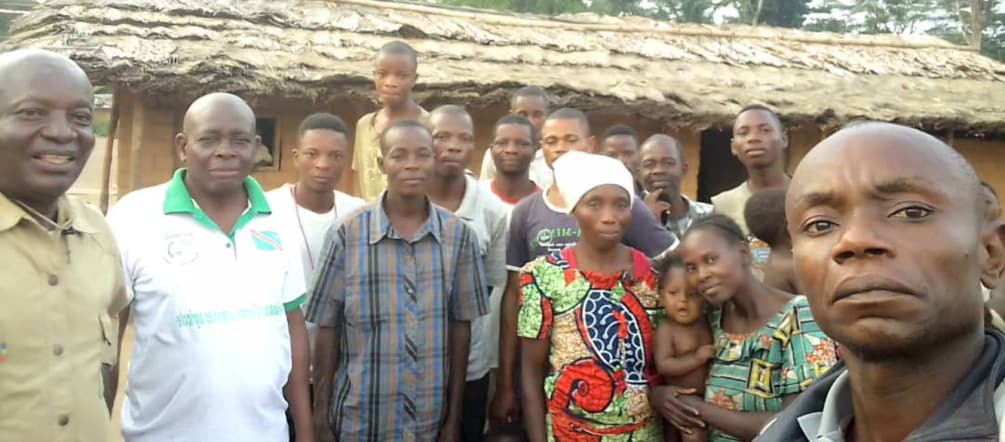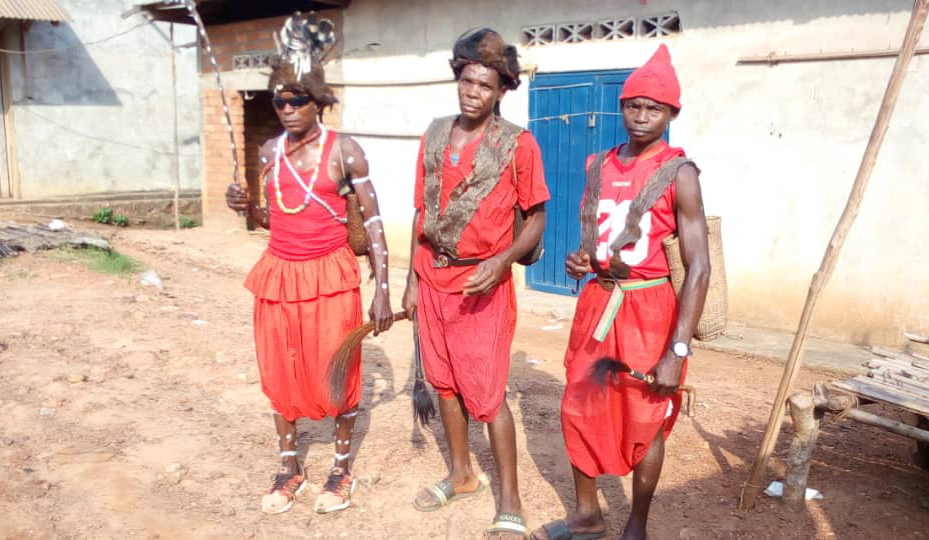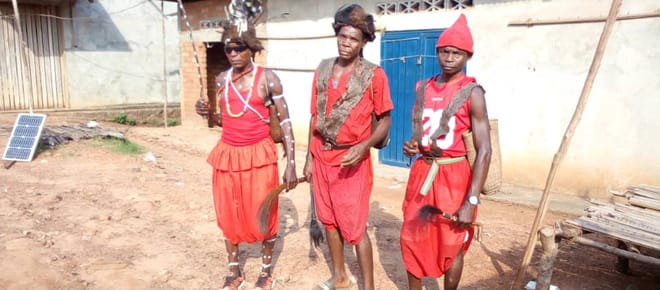
DRC: Release the palm oil protesters jailed in Mwingi!
A march of villagers protesting the palm oil company PHC ended with arrests and horrific violence – villagers were arrested and abused so badly that one man died of his injuries and another remains in critical condition. We demand the immediate release of the prisoners, medical attention for the injured, and an end to the brutality.
News and updatesTo: the authorities of the Democratic Republic of the Congo
“We demand the release of the activists and an end to violence and land grabbing. Local people must finally get their land rights and the right to free consent.”Communities in the Democratic Republic of the Congo have suffered under palm oil companies for decades, and violence has erupted time and again: In 2015, a couple accused of stealing palm oil fruits was killed, and in 2019, the villager Joel Imbangola was beaten to death.
In February 2021, following a protest march against the palm oil company PHC, villagers, including local members of RIAO-RDC, were beaten and jailed. Two reportedly received death threats, and women were sexually assaulted. The occasion for the protest march was an anticipated visit by Kalaa Mpinga, the new CEO of Feronia-PHC. His Mauritius-registered corporation took over the plantations in 2020.
The villagers are accused of “inciting revolt”. Their taking photos of the protest march and giving interviews to journalists is also being held against them.
The roots of the conflict go back 110 years, when the first plantations were established. The local people were never consulted, but were simply robbed of their ancestral land and thus their livelihood.
We demand:
- the immediate release of the prisoners
- an end to violence, criminalization and land grabbing
- respect for the human rights of local people affected by the plantations
- that the peaceful expression of opinions must not end in arbitrary arrests and violence
- that international development banks pressure their client Feronia-PHC to comply with these requirements

Traditional chiefs in Lokutu (© RIAO-RDC)
The people of the region are suffering from the legacy of the colonial era, the profit interests of foreign investment firms and the activities of international financiers.
The origins of the plantations go back 110 years, when the Belgian colonial government handed over large tracts of forest to the English businessman Lord Leverhulme. These concessions were the cornerstone for today’s multinational, Unilever. In 2009, Unilever sold its lands to Feronia Inc., a Canadian company. When it went bankrupt in 2020, Straight KKM, a corporate investor based in Mauritius, acquired the plantations.
Numerous development banks in industrialized countries have a stake in the Feronia-PHC plantations: At the time of Feronia’s collapse, they held the majority of shares in Feronia Inc., either directly (CDC Group of the UK) or via investment in a fund (France’s Proparco, Spain’s AECID and the US’s DFC), and have loan repayments worth tens of millions of dollars outstanding (CDC - UK, DEG - Germany, FMO - Netherlands, BIO - Belgium and others via the Emerging Africa Infrastructure Fund).
The communities demand the return of their land, the use of which has been denied them for over 100 years without their consent. A coalition of international organizations is therefore putting the development banks under pressure.
The rainforests in the Congo Basin are still largely intact. However, the conversion of palm groves into industrial plantations is also harming the forests. In this regard, the oil palm plantations of Feronia-PHC in the Democratic Republic of the Congo can look back on a century-old tradition of destruction. 25,000 hectares of forest have already fallen victim to the company’s operations. The concessions are vast: They extend over 107,000 hectares – an area roughly the size of New York City.
To: the authorities of the Democratic Republic of the Congo
Ladies and Gentlemen,
The inhabitants of many communities in the Democratic Republic of the Congo have suffered under the palm oil company PHC for decades. Violence has erupted time and again: In 2015, a couple accused of stealing palm oil fruits was killed, and in 2019, the villager Joel Imbangola was beaten to death. People who stood up to the company were detained on several occasions.
In mid-February, local members of the human rights organization RIAO-RDC were wrongfully arrested in Mwingi and Bolesa after a protest march against Feronia-PHC. Two reportedly received death threats, and women were sexually assaulted. The villagers are accused of “inciting revolt”. Taking photos of the protest march and giving interviews to journalists is also being held against them.
We demand the immediate release of the innocent protesters and an end to the violence, criminalization and land grabbing. The local people affected by the plantations must finally get their land rights and the right to free, prior and informed consent. We call on the international development banks to pressure their client Feronia-PHC to comply with these requirements.
Yours faithfully,
CC:
the management of Feronia/KKM
the management of international development banks
The issue – rainforest on our dinner tables and in our fuel tanks
At 66 million tons annually, palm oil is the most commonly produced vegetable oil. Its low world market price and properties that lend themselves to processed foods have led the food industry to use it in half of all supermarket products. Palm oil can be found in frozen pizzas, biscuits and margarine, as well as body creams, soaps, makeup, candles and detergents.
Few people realize that almost half of the palm oil imported into the EU is used as biofuel. Since 2009, the mandatory blending of biofuels into motor vehicle fuels has been a major cause of deforestation.
Oil palm plantations currently cover more than 27 million hectares of the Earth’s surface. Forests and human settlements have been destroyed and replaced by “green deserts” containing virtually no biodiversity on an area the size of New Zealand.
The impact – suffering and death in producer countries, climate havoc
The warm, humid climate of the tropics offers perfect growth conditions for oil palms. Day after day, huge tracts of rainforest in Southeast Asia, Latin America and Africa are being bulldozed or torched to make room for more plantations, releasing vast amounts of carbon into the atmosphere. As a consequence, Indonesia – the world’s largest producer of palm oil – temporarily surpassed the United States in terms of greenhouse gas emissions in 2015. With their CO2 and methane emissions, palm oil-based biofuels actually have three times the climate impact of traditional fossil fuels.
Palm oil is not only bad for the climate: As their forest habitat is cleared, endangered species such as the orangutan, Borneo elephant and Sumatran tiger are being pushed closer to extinction. Smallholders and indigenous people who have inhabited and protected the forest for generations are often brutally driven from their land. In Indonesia, more than 700 land conflicts are related to the palm oil industry. Human rights violations are everyday occurrences, even on supposedly “sustainable” and “organic” plantations.
As consumers, we are largely unaware of these broader issues, yet our daily palm oil consumption also impacts our health: refined palm oil contains large amounts of harmful fatty acid esters that are known to damage DNA and cause cancer.
The solution – a revolution on our dinner tables and in our fuel tanks
Only 70,000 orangutans still roam the forests of Southeast Asia, yet the EU’s biofuels policy is pushing them to the brink of extinction. Every new plantation on Borneo is destroying a further piece of their habitat. Stepping up the pressure on policymakers is a must if we want to save our tree-dwelling kin. Apart from that, however, there is still a lot we can do in day-to-day life.
Follow these simple tips to recognize, avoid and combat palm oil:
- Enjoy a home-cooked meal: Use your imagination: why not try almond-coconut-pear biscuits? Or pizza with potato and rosemary? A meal cooked from fresh ingredients beats processed foods containing palm oil every time. Oils such as sunflower, olive, rapeseed or flaxseed are ideal for cooking and baking.
- Read labels: As of December 2014, labeling regulations in the EU require food products to clearly indicate that they contain palm oil. However, in the case of non-food items such as cosmetics and cleaning products, a wide range of chemical names may still be used to hide the use of palm oil. A quick check of your favorite search engine will turn up palm oil-free alternatives, however.
- Remember that the customer is king: Ask your retailers for palm oil-free products. Write product manufacturers and ask them why they aren’t using domestic oils. Companies can be quite sensitive to issues that give their products a bad name, so inquiring with sales staff and contacting manufacturers can make a real difference. Public pressure and increased awareness of the problem have already prompted some producers to stop using palm oil.
- Sign petitions and write your elected representatives: Online campaigns put pressure on policymakers responsible for biofuels and palm oil imports. Have you already signed all of Rainforest Rescue’s petitions?
- Speak out: Protest marches and creative action on the street raise public and media awareness of the issue, which in turn steps up the pressure on policymakers.
- Leave your car at home: Whenever you can, walk, ride a bicycle or use public transport.
- Be informed and inform others: Big Business and governments would like us to believe that biofuels are good for the climate and that oil palm plantations are sustainable. Spread the word – share this information with your family and friends and encourage them to rethink their consumption habits. It’s in our hands!

Fearing arbitrary arrests and violence, numerous villagers have fled into the forest on the outskirts of PHC’s oil palm plantations. Local people are suffering the impact of land grabs that have cost them their livelihoods.
DEG, a German development organization, sold its shares in the Congolese plantation company PHC at the end of February. DEG and other development banks had turned a blind eye to the company’s land grabs and acts of violence when they originally invested $150 million in the oil palm plantations. The current development could leave local people vulnerable to the whims of the new investors.
The conflict between the communities of Bolanga and Yambienenne and the palm oil company PHC continues to escalate in the Democratic Republic of the Congo (DRC). Once again, several people were arbitrarily arrested, including a representative of RIAO-RDC, a human rights organization. Security forces damaged numerous huts and destroyed people’s belongings during searches.